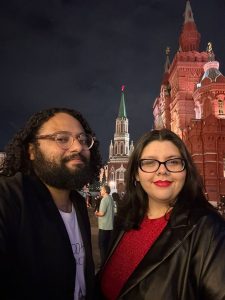Postgraduate students André Lisboa and Beatriz Graça from the State University of Southwest Bahia (Brazil) spent four months in Moscow, where they were interning at the Centre for Sociocognitive Discourse Studies (SCoDis) at the Moscow State Linguistic University (MSLU) under the guidance of the Centre’s Director, Dr. Olga Kamaludinovna Iriskhanova.
The researchers of SCoDis shared their experience in conducting research related to the study of gesture behaviour of speakers under different conditions, showed the Brazilian colleagues the technical capabilities of the laboratory – the features of recording material with the subjects. They also discussed the format of annotating of the collected data in Elan software and its subsequent analysis in course of the project.
The students from Brazil also took part in a joint Brazilian-Russian seminar organised in an online format, where PhD students, researchers and project leaders talked about their research and had the opportunity to ask each other all the questions they were interested in.
Within the framework of cooperation between the universities, a project on the analysis of recurrent gestures in Russian and Portuguese, supported by the Russian Science Foundation, is being implemented. The team of the Brazilian university is led by Professor Dr Maira Avelar, Director of the Cognitive Linguistics and Gesture Studies Laboratory (LabGest) at the University of Bahia.
André Lisboa and Beatriz Graça are currently working on their PhD theses on the analysis of speakers’ polymodal behaviour in different types of discourse. André’s research interests focus on the integration of hand gestures and gaze direction in the marking of Mental Spaces and Viewpoints in Brazilian talk shows. He is currently working on his doctoral dissertation titled “Gestures and Gaze Direction in Televised Interviews as Markers of Mental Spaces and Narrative Viewpoints.”
Beatriz’s research interests lie in the relationship between language use and gestures, with a particular focus on recurrent gestures associated with negative meanings. She is presently developing her doctoral dissertation titled “Recurrent Gestures in Brazilian Portuguese: Identification and Analysis of Gestures of Negation.”
We were pleased to host our Brazilian colleagues in Moscow and look forward to our further co-operation.

